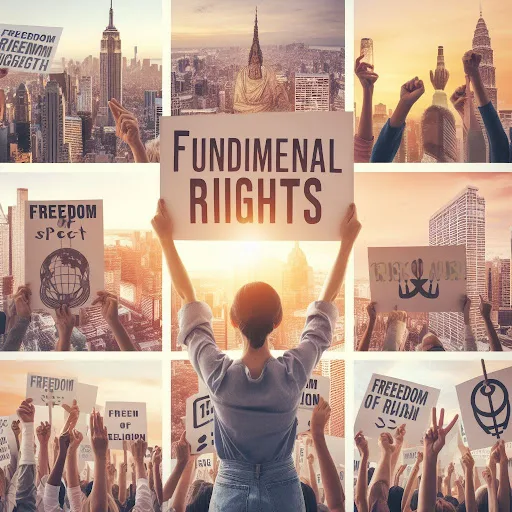FUNDAMENTAL RIGHTS
Every Republic ensure rights to its civilians without any discrimation. These rights make a democratic state a republic. Republic on India also provide some rights to its civilians, and these rights never be violate even in the formation of new laws. Following are the fundamental rights: |
| Fundamental Rights | Image generated via Bing Image Creator |
General
12. Definition.13. Laws inconsistent with or in derogation of the fundamental rights.
Right to Equality
14. Equality before law.15. Prohibition of discrimination on grounds of religion, race, caste, sex or place of birth.
16. Equality of opportunity in matters of public employment.
17. Abolition of Untouchability.
18. Abolition of titles.
Right to Freedom
19. Protection of certain rights regarding freedom of speech, etc.20. Protection in respect of conviction for offences.
21. Protection of life and personal liberty.
21A. Right to education.
22. Protection against arrest and detention in certain cases.
Right against Exploitation
23. Prohibition of traffic in human beings and forced labour.24. Prohibition of employment of children in factories, etc.
Right to Freedom of Religion
25. Freedom of conscience and free profession, practice and propagation of religion.26. Freedom to manage religious affairs.
27. Freedom as to payment of taxes for promotion of any particular religion.
28. Freedom as to attendance at religious instruction or religious worship in certain educational institutions.
Cultural and Educational Rights
29. Protection of interests of minorities.30. Right of minorities to establish and administer educational institutions.
31. [Repealed.]
Saving of Certain Laws
31A. Saving of Laws providing for acquisition of estates, etc.
31B. Validation of certain Acts and Regulations.
31C. Saving of laws giving effect to certain directive principles.
31D. [Repealed.]
Right to Constitutional Remedies
32. Remedies for enforcement of rights conferred by this Part.32A. [Repealed.]
33. Power of Parliament to modify the rights conferred by this Part in their application to Forces, etc.
34. Restriction on rights conferred by this Part while martial law is in force in any area.
35. Legislation to give effect to the provisions of this Part.